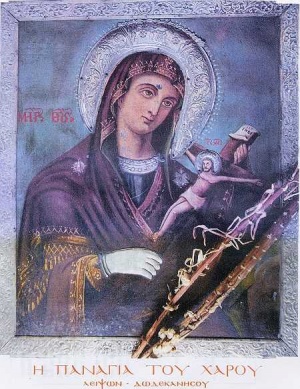Difference between revisions of "Panagia tou Harou"
m (Tried to correct grammar and expression) |
m |
||
| Line 1: | Line 1: | ||
[[Image:panagia_tou_xarou.jpg|thumb|left|Icon of Panagia tou Harou]] | [[Image:panagia_tou_xarou.jpg|thumb|left|Icon of Panagia tou Harou]] | ||
| − | |||
| − | |||
| − | |||
| − | |||
'''Panagia tou Harou''' is the name of the unique icon which depicts the Virgin Mary cradling the Crucified Christ rather than the God Child from where it gets its name (Haros in Greek means death). This icon is found in the church of Saint John the Theologian, Leipsoi (Greece). The annual commemoration of the icon takes place [[August 23]] when the island of Leipsoi fills with pilgrims from all over the Dodecanese, to witness the procession of the icon around the entire island and see the annual blossoming of the dead bouquet of lillies on the icon. | '''Panagia tou Harou''' is the name of the unique icon which depicts the Virgin Mary cradling the Crucified Christ rather than the God Child from where it gets its name (Haros in Greek means death). This icon is found in the church of Saint John the Theologian, Leipsoi (Greece). The annual commemoration of the icon takes place [[August 23]] when the island of Leipsoi fills with pilgrims from all over the Dodecanese, to witness the procession of the icon around the entire island and see the annual blossoming of the dead bouquet of lillies on the icon. | ||
| − | + | In the 1940s, a lady was praying to the "Panagia tou Harou" icon. Her prayers were answered, and in gratitude placed a simple bouquet of lillies on the icon. These lillies withered but remained on the icon. In the following year, at the leave-taking of the feast of the Dormition [[August 23]], these lillies blossomed again and gave off a fragrance. Since then, this miracle occurs annually on the day of the feast. | |
| − | In the 1940s, a | ||
== See also == | == See also == | ||
| − | *[[ | + | *[[Icons of the Theotokos]] |
== External links == | == External links == | ||
| − | *[[w:Leipsoi|Leipsoi on Wikipedia]] | + | *[[w:Leipsoi|Leipsoi on Wikipedia]] to read more about the island |
[[Category:Icons]] | [[Category:Icons]] | ||
[[Category:Icons of the Theotokos]] | [[Category:Icons of the Theotokos]] | ||
[[Category:Theotokonymia]] | [[Category:Theotokonymia]] | ||
Revision as of 11:19, May 2, 2008
Panagia tou Harou is the name of the unique icon which depicts the Virgin Mary cradling the Crucified Christ rather than the God Child from where it gets its name (Haros in Greek means death). This icon is found in the church of Saint John the Theologian, Leipsoi (Greece). The annual commemoration of the icon takes place August 23 when the island of Leipsoi fills with pilgrims from all over the Dodecanese, to witness the procession of the icon around the entire island and see the annual blossoming of the dead bouquet of lillies on the icon.
In the 1940s, a lady was praying to the "Panagia tou Harou" icon. Her prayers were answered, and in gratitude placed a simple bouquet of lillies on the icon. These lillies withered but remained on the icon. In the following year, at the leave-taking of the feast of the Dormition August 23, these lillies blossomed again and gave off a fragrance. Since then, this miracle occurs annually on the day of the feast.
See also
External links
- Leipsoi on Wikipedia to read more about the island
